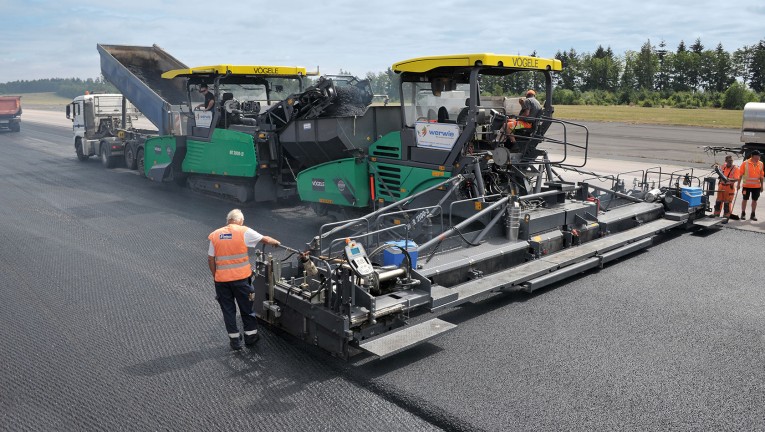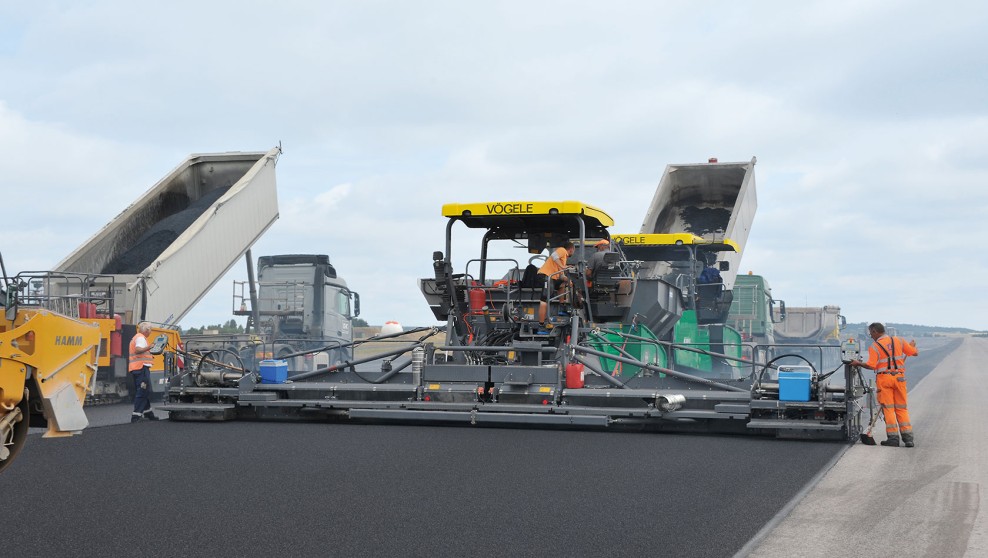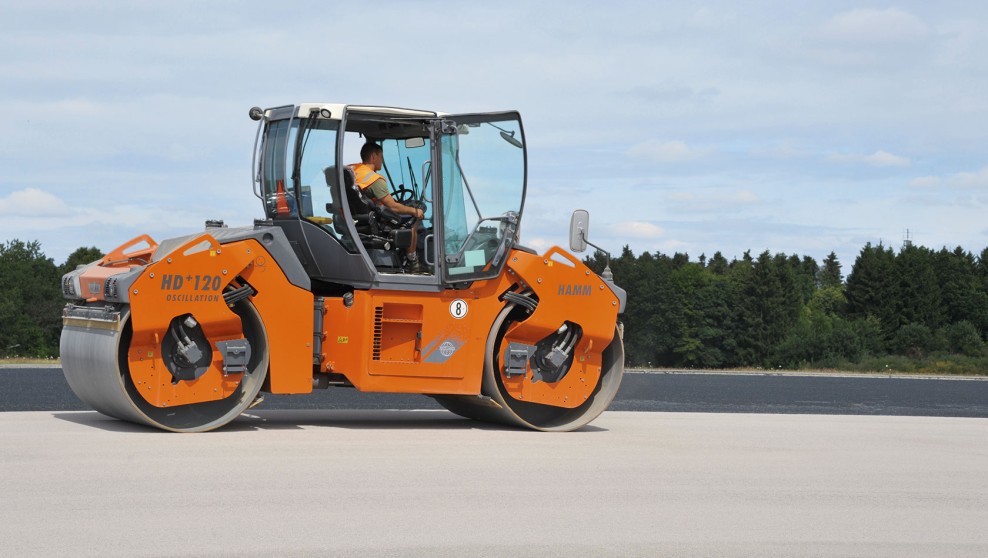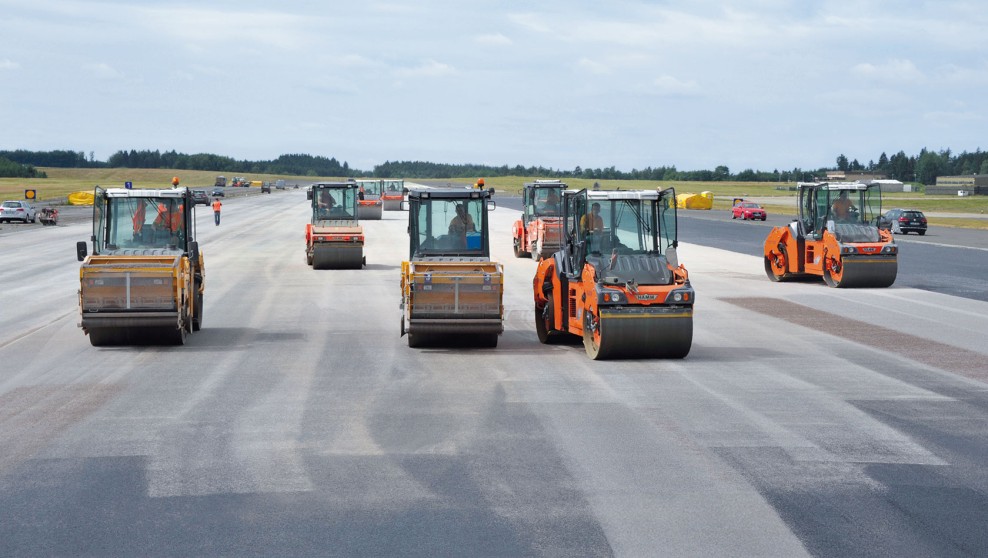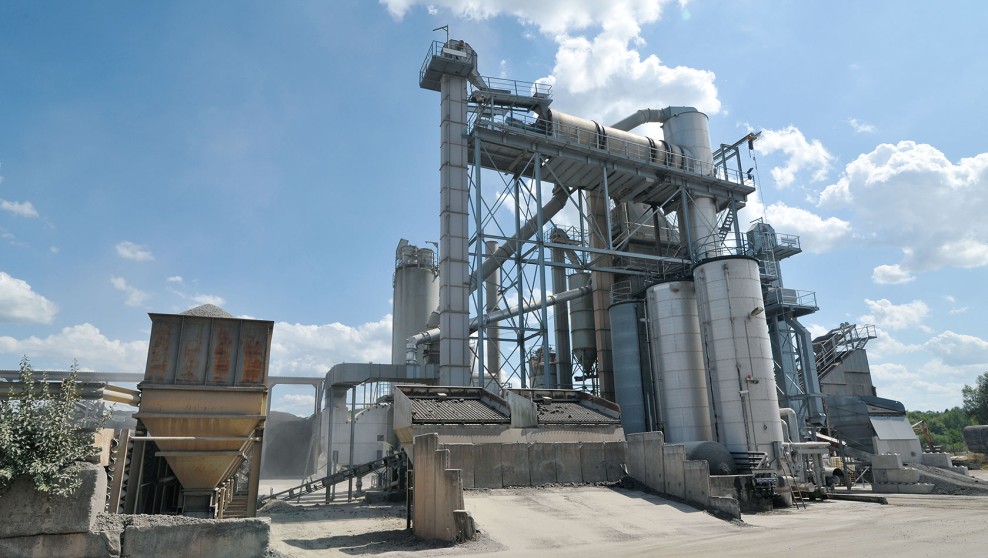Reconstruction of the runway at Büchel Air Base
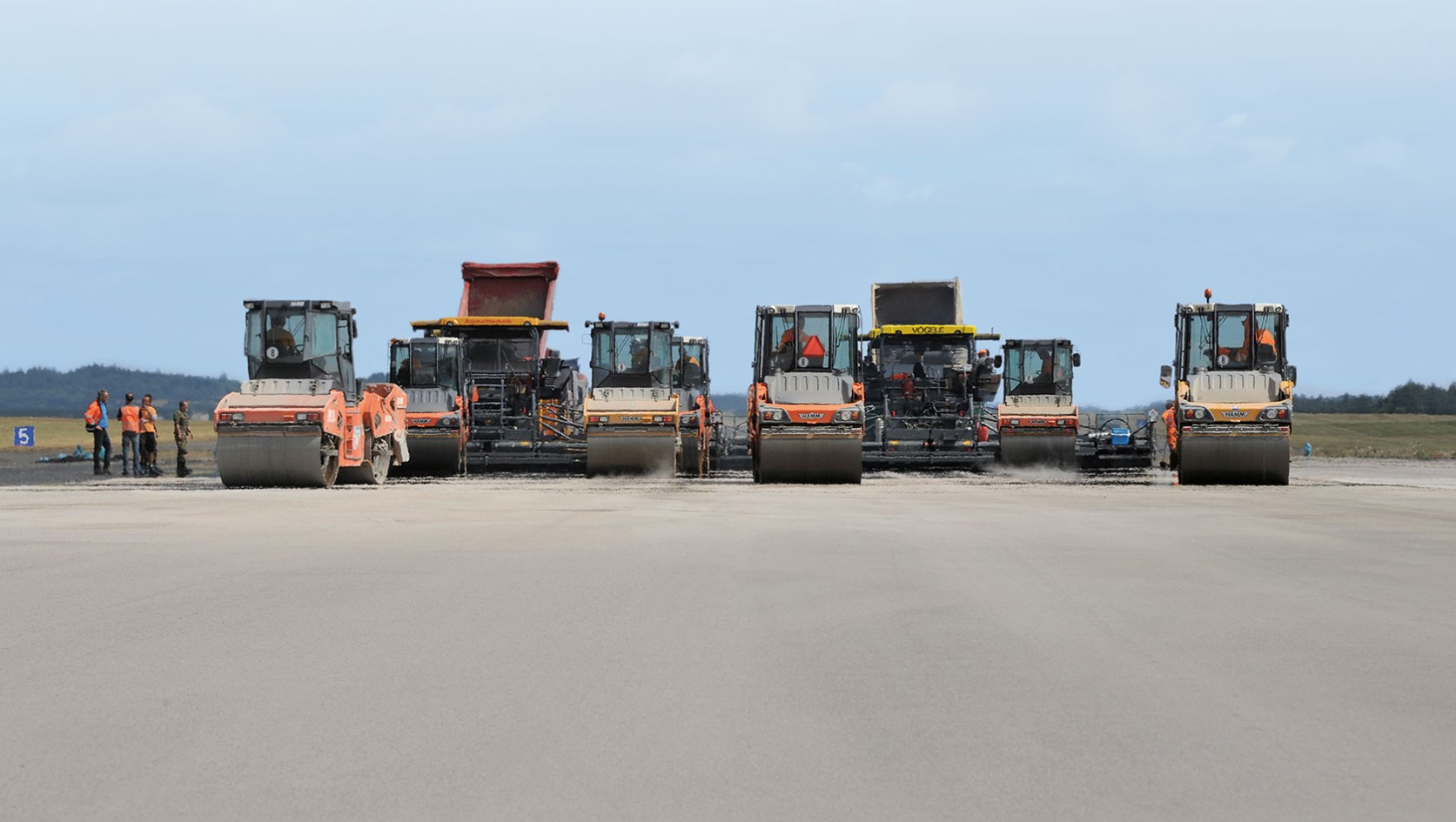

Concentrated power of the WIRTGEN GROUP on the job at Büchel Air Base: Together with asphalt mixing plants from BENNINGHOVEN, machines built by WIRTGEN, VÖGELE and HAMM successfully reconstructed the surface course and handed over a top quality runway right on schedule. The success was based on painstakingly planned site logistics, reliability and precision of machine technology and the commitment of the contractors involved.
Every month, Tornado aircraft take off and land roughly 200 times at Büchel Air Base, set amid the uplands of the Eifel region. Large transport planes also take off and land here. After more than ten years of service and several harsh winters, signs began to emerge that there was a risk of “foreign object damage” (FOD) on the runway. FOD is the damage sustained by aircraft, for instance when they draw in mineral particles from the asphalt, which may destroy the jet engines as they start up. Such “foreign objects” are hence a bane for all airfield operators.
When loose particles measuring up to 5cm in diameter were occasionally found on the runway in Büchel, planning started immediately for reconstruction of the roughly 4.5cm-thick asphalt surface course with its 0.5cm overlay of anti-skid material. The Brenner engineering office in Hennef, Germany, considered several possibilities during the planning process. In the end, they decided to reconstruct the surface course with stone mastic asphalt. Compared to conventional materials, stone mastic asphalt offers much better non-skid properties, is durable and highly resistant to deformation.
The first step was to remove the damaged asphalt pavement with the aid of WIRTGEN cold milling machines, a job that was carried out in two passes. The first 5 – 10mm were interspersed with anti-skid material and had to be disposed of separately. For this reason, the top layer was removed to a depth of exactly 10mm by super-fine milling. This sufficed to remove the entire layer and at the same time minimize the volume of special waste. A perfect job for the two WIRTGEN milling machines of type W 210i, both fitted with a microfine milling drum with 1008 cutting tools distributed over a milling width of 2m.
Needless to say, accurate levelling is essential for such a precision job. On large milling machines, the modern automatic levelling system LEVEL PRO ensures that the milling depth is precisely adhered to. The height is adjusted via four lifting columns in the front and rear crawler tracks, all of which are interlinked hydraulically. As soon as one of the crawler tracks runs over an elevation or into a depression, the other tracks automatically balance out the resultant difference in height. This four-fold full floating axle system ensures that the machine always adapts to the base.
When working at small milling depths, only one of the two engines installed in the machines is running. This reduces fuel consumption considerably.
Dieter Klein, Managing Director DKS Gesellschaft für Fahrbahnsanierungen (Society for Road Pavement Rehabilitation)
The two large milling machines, each with an on-board power rating of 537kW, work their way through the asphalt at an enormous operating speed of roughly 25m/min. An even larger cold milling machine followed hot on their heels, almost matching them for speed: a W 250 with a milling width of 3.8m. It removed the remaining asphalt surfacing to a depth of some 3.5cm in a second pass. Incidentally, two diesel engines are installed in each of the three cold milling machines. The principle: one engine is in operation all the time to provide a drive for all function groups, while the second engine is only activated when required.
One particular challenge was to ensure a sufficient supply of water. The water is injected into the milling chamber to bind dust and cool the cutting tools. Each of the large milling machines comes with two separate water spray bars. The water pressure adjusts as a function of load and the water quantity is infinitely variable for optimal cooling of the cutting tools. Around 60,000 litres of water were needed every day for the three milling machines – an exceptionally large amount. When all 103,000m² of asphalt surfacing had been removed after just four working days, the VÖGELE pavers and HAMM rollers appeared on the scene to pave and compact the new surface course.
The general contractor Juchem Asphaltbau brought first class equipment to Büchel to pave asphalt for the new surface course: two VÖGELE pavers of type SUPER 2100-2 and SUPER 2100-3i, each combined with a SB 250 TV Fixed-Width Screed built up to 11.5m. To ensure continuous paving and maximum pavement quality, a VÖGELE material feeder was working in front of each paver. The newest of the two pavers, the SUPER 2100-3i, had only been delivered to Juchem Asphaltbau in May and got to work on its first job at Büchel Air Base. The paver needed no more than one day to pave the surface course on the outer right-hand strip of the 2.3km runway. On the second day, the SUPER 2100-3i and the SUPER 2100-2 were on the scene, each of them together with a VÖGELE material feeder.
The paving teams were an impressive sight when working “hot to hot” at a pave speed of 2.5 – 4m/min, building a quasi-jointless asphalt pavement in a total width of 23m. A pavement without a centre joint is of great importance for the durability of the surface course in the central part of the runway, where it is exposed to greatest load. Finally, the team of SUPER 2100-3i and material feeder paved asphalt on the outer left-hand strip in a width of another 11.25m. The result was an asphalt pavement 46m wide with a constant transverse slope of 1.4% and just two “real” joints far away from the centreline.
Hydraulic bolt-on extensions help us achieve any intermediate width whatsoever, even with a fixed width screed – an extremely practical solution.
Markus Stumm, Site Manager Juchem Asphaltbau GmbH & Co. KG
The co-operation of paver and material feeder plays a crucial role in the success of paving projects where large asphalt quantities are involved. In addition to a VÖGELE MT 1000-1, a MT 3000-2i PowerFeeder was used in Büchel, which had been brought to the job site by the Werwie rental company from Konz, Germany, together with a SUPER 2100-2. This heavy-duty material feeder has an impressively large holding capacity: together with the paver, up to 40t of material can be stored. Sturdy and reliable distance control between paver and material feeder is another significant feature for high pavement quality. The VÖGELE PowerFeeder is fitted with a system of three laser cells on the underside of the conveyor, ensuring that a constant distance between material feeder and paver is maintained at all times. An anti-collision system provides for additional safety. If there is any risk of the vehicles colliding, the paver is brought to a halt immediately, thus preventing an imminent collision.
With hydraulic bolt-on extensions from VÖGELE, the pave width of fixed-width screeds, such as the SB 250 TV, can be extended hydraulically by up to 1.5m. This technology combines the advantages of a fixed-width screed with those of an extending screed. As a result, the particularly sturdy fixed-width screeds not only handle large widths, they also are variable.
Extending screeds prove their strengths, for instance, when paving widths to 18m of true to line and level.
Ten HAMM rollers behind the two VÖGELE pavers carried out high-quality compaction of the new surface course. For this job, Juchem and Werwie chose articulated rollers of the HD+ and HD series with operating weights between 9 and 12t, four of them equipped with oscillating drums. An outstanding feature of the HD+ series is the excellent view from the fully glazed cabin, nothing obstructs the operator’s visibility. He always has a clear view of the job site, his working area and the drums. This significantly enhances the rollers’ high safety standard.
“Outstanding visibility is one of the reasons why customers like to rent our HD+ series HAMM rollers,” explains Matthias Beckmann, Rental Park Manager at Werwie. In addition, the large, heavy rollers from the HD and HD+ series used in Büchel are particularly appreciated for their high performance per unit area. It results from the combination of wide drums with large diameters, powerful drives and an intelligent automatic reversing function. The rollers, furthermore, feature amply dimensioned tanks for diesel fuel and water allowing to work throughout an entire shift without a need for refilling. This way, HAMM rollers are equipped with all it takes to achieve high productivity – one of the reasons why they were used for the Büchel Air Base project.
The driver’s seat on the HD+ rollers can be moved right up to the outer edge of the cabin and pivoted through 90° in either direction.
Developed by HAMM, this compaction technology is equally advantageous for compaction work on small areas, bridge decks or in multi-storey car parks, and for large areas, such as motorways or airport runways.
One third of the rollers working on the Büchel project were equipped with oscillating drums.
Another key feature of the HD+ series is the very favourable weight and load distribution. It is due above all to the position of the articulated joint almost in the machine centre and its specific kinematic characteristics. This results in excellent driving stability. And thanks to their uniform weight distribution, HAMM rollers from the HD+ series are capable of producing surfaces of perfect evenness very rapidly, a circumstance of particular importance when it comes to compacting surface courses. In addition to load distribution, the water sprinkling system is also crucial for compaction quality. This is why HAMM equip their HD+ series rollers with powerful pumps delivering the required amount of water precisely and reliably to the spray nozzles. The water sprinkling system can be easily monitored by the operator, who always has a clear view of the spray bars from his panoramic cabin due to the smart frame design. The amount of water applied is conveniently adjusted from the operator’s station. Last but not least, storing the water in two separate tanks provides for uniform weight distribution in any operating situation.
On a project of this size, large amounts of asphalt need to be produced in a very short time. In Büchel, three BENNINGHOVEN mixing plants owned by the Juchem Group produced no less than 10,000t in four days. While the two pavers worked simultaneously, each of the mixing plants in Ürzig and Niederwörresbach prepared some 140t, and the plant in Boppard some 160t of stone mastic asphalt per hour. The three mixing plant supervisors were in contact with each other all the time throughout the four days in order to ensure that the two high-performance pavers were continuously supplied with the required quantities of mix. During these days, up to 50 lorries were in operation. The identical quality of the mix produced in each of the three mixing plants was an important requirement for the project's success.
With this in mind, Juchem used raw material from the same quarries at all three locations and carried out numerous checks. Not only the mixing plants’ capacity, but also their technology was crucial for the asphalt quality. “We use modern BENNINGHOVEN control systems at all three locations. As a result, we were able to set up the plants precisely and produce exactly the desired mix. At the same time, the new control systems allowed energy-saving mixing, thus cutting the costs of consumables,” explains Mixing Plant Supervisor Karl-Heinz Thiem.
The Juchem Group’s BENNINGHOVEN asphalt mixing plants are operated by EVO JET burners of the latest generation.
Karl-Heinz Thiem monitors and controls the BENNINGHOVEN type BA 3000 asphalt mixing plant in Ürzig installed back in 1986. It was one of the first mixing plants built by BENNINGHOVEN. Even then, the youngest member of the WIRTGEN GROUP was coming up with visionary concepts characterized by their great flexibility. This consequently made it possible to modernize and enlarge the plant repeatedly with new technology, such as a new control system.
Once in operation, a BENNINGHOVEN burner keeps going and going. It’s the Mercedes among burners!
Karl-Heinz Thiem, Mixing Plant Supervisor in Ürzig Juchem GmbH & Co. KG
After two weeks of highly concentrated work with WIRTGEN GROUP machinery and plants, Juchem completed this demanding project, from milling through to paving and compaction, right on schedule. The customer’s project manager, Uwe Müller from LBB (state-owned company for properties and construction supervision) in Rhineland-Palatinate, Germany, was fully satisfied with the project’s punctual completion and outstanding result: “We are right on schedule and the quality of the asphalt pavement is impeccable.” After no more than two weeks in the hands of the construction machinery, the Air Base could be handed back to its operators.
Tracked paver Special Class
| Basic width | 2,98 m |
| Pave width, max. | 8,5 m |
| Maximum laydown rate | 1 100 t/h |
Tandem roller with two vibration drums
| Weight | 9,220 kg |
| Drum width | 1,680 mm |
| Exhaust emissions category | EU Stage V / EPA Tier 4 |
Tandem roller with vibration and oscillation drum
| Weight | 9,220 kg |
| Drum width | 1,680 mm |
| Exhaust emissions category | EU Stage V / EPA Tier 4 |
Tandem roller with two vibration drums
| Weight | 9,700 kg |
| Drum width | 1,680 mm |
| Exhaust emissions category | EU Stage V / EPA Tier 4 |
Tandem roller with vibration and oscillation drum
| Weight | 9,460 kg |
| Drum width | 1,680 mm |
| Exhaust emissions category | EU Stage V / EPA Tier 4 |
Tandem roller with vibration drum and set of wheels
| Weight | 8,720 kg |
| Drum width | 1,680 mm |
| Exhaust emissions category | EU Stage V / EPA Tier 4 |
Tandem roller with vibration drum and set of wheels
| Weight | 8,960 kg |
| Drum width | 1,680 mm |
| Exhaust emissions category | EU Stage V / EPA Tier 4 |
Transportation asphalt mixing plant
| Nominal mixing capacity | 160 - 320 t/h |
| Hot bin section | 60 - 150 t |
| Mixed material loading silo | 0 - 517 t |
Transportation asphalt mixing plant
| Nominal mixing capacity | 160 - 320 t/h |
| Hot bin section | 60 - 150 t |
| Mixed material loading silo | 0 - 517 t |
